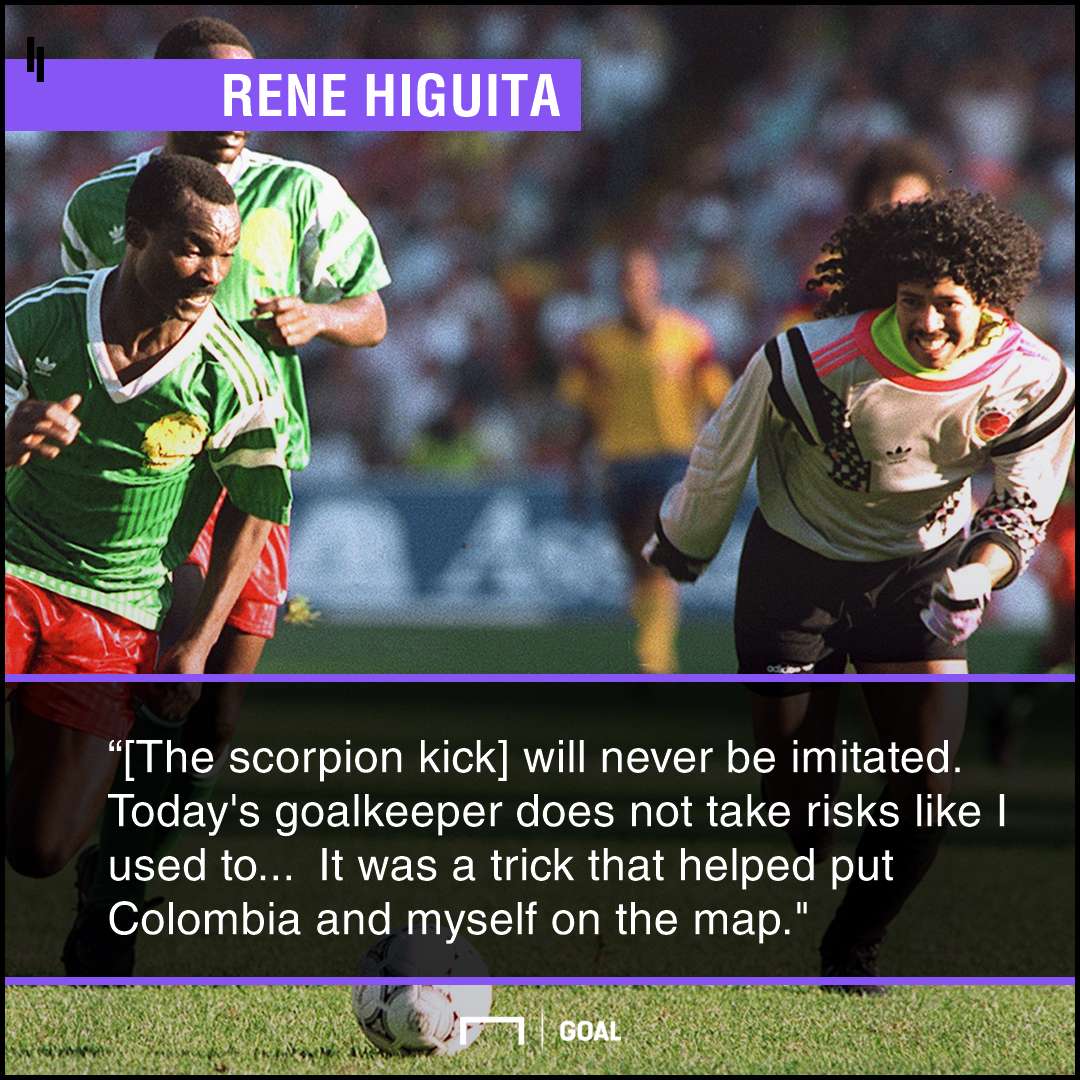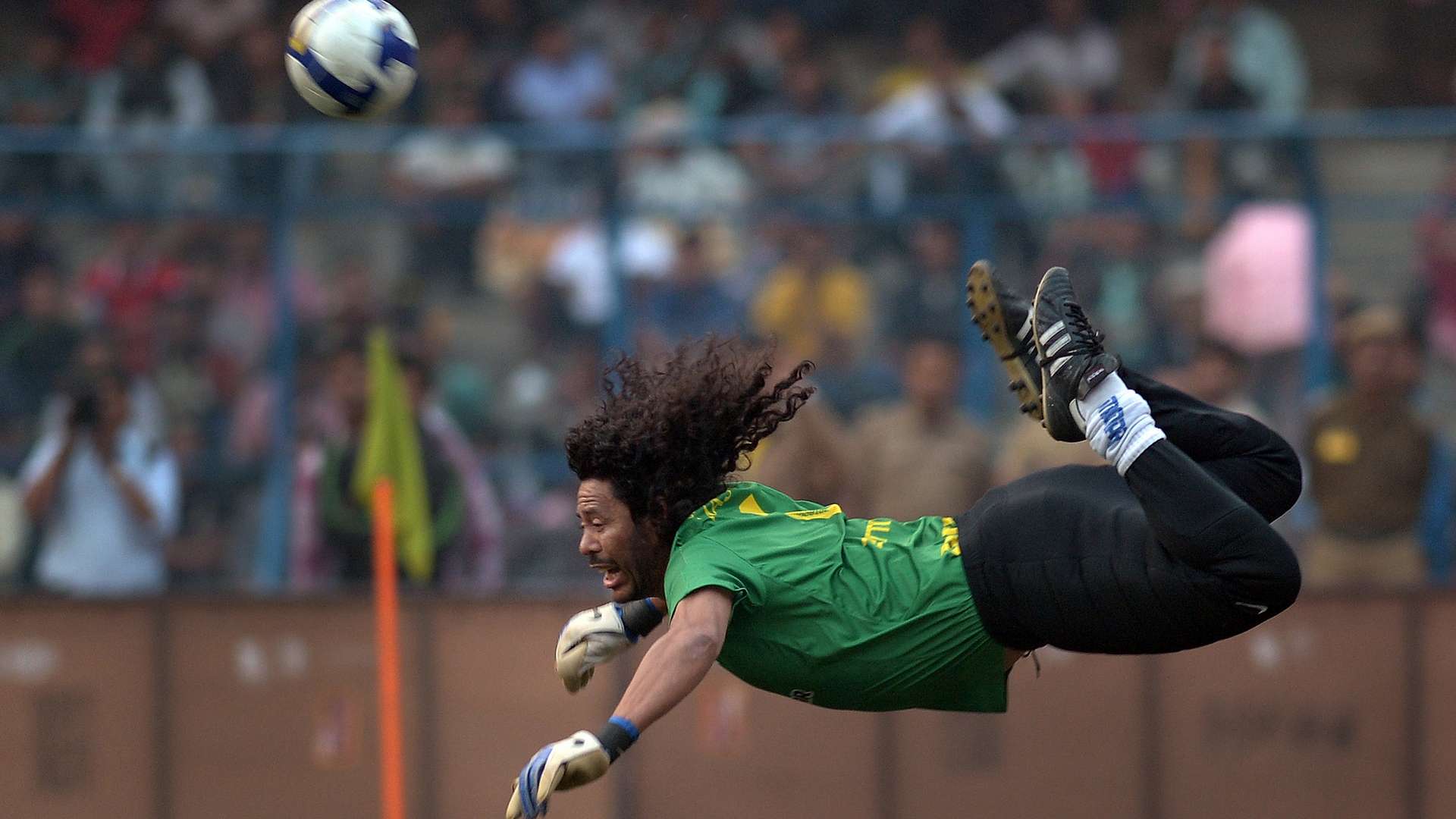It is easy enough to write off Rene Higuita as one of football's most infamous clowns. But to do so would be a disservice to a man who played a bigger part than most in revolutionising the role of the modern goalkeeper.
Would we ever have seen sweeper-keepers like Manuel Neuer, Victor Valdes or Hugo Lloris had the eccentric Colombian shot-stopper not blazed a trail before them? In the 1990s, Higuita redefined the role, showing that a goalkeeper could be as good with his feet as he was with hands.
But who was 'El Loco', and what became of the madcap No. 1 when he finally hung up his gloves?
Higuita's start to life between the posts was just as unorthodox as the rest of his career. The Medellin native was originally a striker and, as a teenager, was top scorer in his school team. An injury to the side's keeper, however, forced him into the net, and he showed such aptitude for the role that he made the position his own.
That outfield influence stayed with him throughout his time in football, though, manifesting itself most notably in his outrageous dribbling skills, which he often employed to torment opposing strikers from deep.
At the tender age of 23, Higuita helped Atletico Nacional to their first-ever Copa Libertadores title, the last line of defence in a team directed by Francisco Maturano and boasting players of the calibre of Andres Escobar, Leonel Alvarez and Luis Perea; essentially, the bulk of the Colombia squad that would play at the 1990 and 1994 World Cups.
The 1990 edition saw the Cafeteros reach the last 16, with Higuita hailed as one of the stars of the tournament, but a failed attempt to dribble past Roger Milla allowed the veteran forward to score the goal that sent Cameroon through to the quarter-finals instead.
Higuita's madcap keeping in Italy, however, had far-ranging implications. Hypnotised by how he played his way out of trouble when receiving the ball from defenders, rather than picking the ball up as was the norm, FIFA took his antics into account when discussing and implementing the back-pass law, a motion that has helped make the modern game far faster and more entertaining for spectators.
In an indirect way, the shot-stopper helped contribute to the chain of events that made football one of the biggest businesses on the planet.
With 41 goals over a career that spanned 24 years, 12 clubs and five countries, Higuita also ranks alongside Jose Luis Chilavert, Rodrigo Ceni and Jorge Campos as one of history's most prolific No.1s.
English fans, meanwhile, immortalised him in 1995 thanks to the sensational 'scorpion kick' he produced to clear an overhit cross from Jamie Redknapp but, behind the tricks, lurked a more tragic side to the goalkeeper, whose problems with the law had already begun by the time he lit up an otherwise forgettable friendly at Wembley.
At 28, he should have been at his prime for the 1994 World Cup but he instead watched the Cafeteros' elimination from home due to a bizarre intervention in a kidnapping case.
Higuita had acted as a go-between for cocaine barons Pablo Escobar – he has never hidden his friendship with the notorious trafficker and even visited him in prison on one occasion – and Carlos Molina, delivering the ransom money that allowed the latter's daughter to go free.
The player pocketed $64,000 for his "helping hand", but was also given seven months in prison without trial, a term that meant when he was eventually released, he was in no shape to make the cut for USA '94.
“I'm a footballer, I didn't know that was a crime,” he said later, having also gone on hunger strike for some two weeks in protest at his irregular detention.
Ten years later and playing in Ecuador, Higuita tested positive for cocaine and received a six-month ban from footballing activities. At that point, he turned his hand to reality television, featuring on popular show Celebrity Island alongside former team-mate Alvarez, and dispensing his outspoken wisdom to fellow contestants.
His footballing career finally ended in 2008, the 42-year-old retiring at Colombian side Deportivo Pereira, and he was later hospitalised for toxoplasmosis – daughter Paula admitted that “we still don't know if he got infected because of the animals in the house (hens, chickens, ducks, five dogs and a horse) or because he likes to eat his meat rare” - before the likes of Carlos Valderrama, Faustino Asprilla and Adolfo Valencia turned out to give him a farewell match in 2010. Higuita, of course, marked the occasion with a repeat of his scorpion kick.
“[The scorpion kick] will never be imitated. Today's goalkeeper does not take risks like I used to; he is a more simple player,” Higuita lamented in an interview with El Pais.
“It was taken from a kids' game; then it came into training. I started to perfect it and, after five years, I decided to try it. I didn't know where, how or when. It was a trick that helped put Colombia and myself on the map.”

Perhaps it is a surprise to learn that after a playing career in which he was rarely out of the headlines, Higuita has cut a more discreet figure since retirement.
The Colombian spent five years working as an assistant for Saudi Arabia's Al-Nassr, first under mentor 'Pacho' Maturana, and later with Italy legend Fabio Cannavaro, before returning to his beloved Atletico Nacional in 2017 to act as the club's goalkeeping coach. Not that he has lost his ability to cause a stir, of course.
The coach affirmed on his Twitter account at the end of 2017 that he would be making a return to football, a promise that had many Nacional fans in ecstasy before realising it was a joke for Innocents' Day – the Spanish version of April Fools' Day.
Higuita has also campaigned for the release in Argentina of 'Higui', a fanatic of the goalkeeper who was jailed for killing a man trying to rape her as part of a homophobic attack.
In another strange twist to his remarkable tale, the ex-goalkeeper was reportedly approached by FARC to be a candidate in future elections, as the guerrilla group transform into a peaceful political force, although Higuita later dismissed the story, claiming he lacked the “academic training” necessary to enter politics.
Whether as a player, a coach or simply going about his daily life, the exuberant personality is clearly never too far away from the headlines. Higuita's legacy, however, goes far deeper than party tricks and controversy: he was a pioneer in his own right, and one of the principal contributors to the sport as we know it today.
